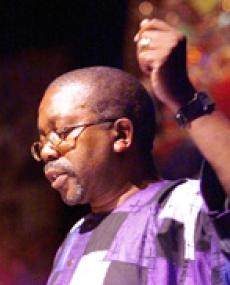
John Matshikiza was born in Sophiatown, Johannesburg in 1954. Sophiatown was soon after demolished to make way for the White suburb of Triomf (Triumph). Matshikiza's father, Todd, was a renowned jazz pianist, composer and journalist who shot to fame in 1958 with his musical King Kong, which had an all-black cast. King Kong helped launch the careers of singer, Miriam Makeba, and musician, Hugh Masekela. Todd Matshikiza was also a founder writer for Drum, the pioneering, black-led magazine edited by Anthony Sampson, who was John's godfather.
In 1961, soon after the Sharpeville massacre, the banning of the political organizations and a state crackdown on the media, Todd Matshikiza went on tour to Britain with King Kong, his family followed. In 1964, they went to Lusaka, Zambia, where Todd Matshikiza became head of broadcasting services for the newly independent country, he died in 1968. After his fathers death John Matshikiza returned to London to study at the Central School of Speech Training and Dramatic Art, Swiss Cottage, and after training with the Royal Shakespeare Company he worked for the Glasgow Citizens Theater Company.
Matshikiza then combined stage acting in London with activism for the African National Congress (ANC). In the early 1970s he helped form Mayibuye, the ANC’s cultural arm. He has also lived in the United States, Amsterdam, and various African countries including Senegal, where he was Director of the Department of Culture of the Gorée Institute for some time. In the 1980s he began to develop a reputation both as a film actor and as a lyrical poet.
One of Matshikiza earliest published poems, And I Watch It in Mandela (1974), was recently republished in a Nelson Mandela anthology:
'It is not for the safety of silence that this man has opened his arms to lead the strength of his words hangs in the air as the strength in his eyes remains on the sky; And the years of impatient waiting draw on while this man burns to clear the smoke in the air. There is fire here, which no prison can kill in this man; and I watch it in Mandela’. Extract from And I Watch It in Mandela (1974).
His poetry achieved critical acclaim; other published works from this period include South Where Her Feet Cool on Ice (1981) and Prophets in the Black Sky (1986).
Some of his notable acting roles in this period include; Cry Freedom (1987) and 1987's Mandela, in which he played the role of Walter Sisulu.
When Mandela was released in 1990, Matshikiza decided to return to South Africa after 30 years of living abroad.
"We'd been waiting all of our lives for this. That is all I can say. It was the whole of my life." – Matshikiza on Mandela’s release and coming home.
He was back in Johannesburg by 1991 and immediately began writing and working in theatre, film and television. He directed plays at the Market and Windybrow theatres and wrote and directed documentaries and dramas for television. He appeared in various films like; Wah-Wah (2005), Richard E Grant's exploration of the pre-independence Swaziland of his youth, Leon Schuster's There's a Zulu on My Stoep (1993) and Hijack Stories (2000). He also appeared with Kevin Bacon in The Air Up There and Angelina Jolie and Clive Owen in Beyond Borders. One of Matshikiza's last acting roles was as the villain in the third series of the SABC3 television series Hard Copy.
In addition to his role as a dramatist, Matshikiza was also a columnist for the Mail & Guardian newspaper and wrote for Business Day and The Weekender. He presented a BBC radio series, contributed to several British and American publications and was an author for the online openDemocracy.net, one of the leading independent websites on global current affairs. He won several journalism prizes; in particular, in 2002 he won the regional and national Vodacom Journalist of the Year Award in the specialist category for his column, which appeared in a collection of his and his father Todd's works titled With the Lid Off: South African Insights from Home and Abroad, published in 2000.
Matshikiza died of a heart attack on 15 September 2008. He was 54 years old. He is survived by his mother Esme, who lives in Cape Town, his ex-wife Eva Kavuma, and his two daughters Lindiwe and Fubi.
Matshikiza's friend Ronald Suresh Roberts described him as "the gentle ex-columnist", because he tended to avoid the most pressing debates within the South African media, taking a left-field approach. His great strength as a journalist was that he was never seduced by offers of power or patronage and was never afraid to poke barbs at the new elite. Another friend, Ismail Mahomed, said: "John was betrayed in many ways by our new democracy simply because he refused to fall into the comfort zone of being a 'returned exile'. John was unafraid to speak out against a new breed of African opportunists just as much as he was unafraid to challenge old-style racists. I'll sorely miss his brilliance."
His Writings
- Our Democracy
- Matshikiza, J. Dakar, once again. Open Democracy online, 18 March 2003. opendemocracy.net
- Matshikiza, J. Africa's arsenal: the sustainable village. Open Democracy online, 24 June 2003. opendemocracy.net
- Mail And Gardian
- Matshikiza, J. Even Confucius, he confused. Mail and Guardian, 4 June 2007.
- Matshikiza, J. Natural-born matricide. Mail and Guardian, 30 April 2007.